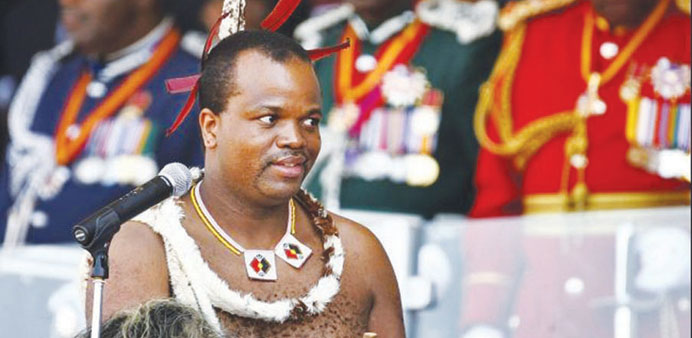Voters in Africa’s tiny mountain kingdom of Swaziland yesterday cast their ballots in legislative elections dismissed by critics as a rubber stamp for King Mswati III’s absolute rule.
They will vote for 55 lawmakers, with candidates hand-picked by traditional chiefs loyal to the king.
Political parties are not uniformly banned, but cannot contest elections.
The 45-year-old head of sub-Saharan Africa’s last absolute monarchy holds ultimate sway over the government, can veto new laws, dissolve parliament and may not be sued or charged.
Days before the poll, he chose an 18-year-old to serve as his 14th wife.
As they patiently lined up to cast their ballots, not all of the country’s 415,000 registered voters expressed satisfaction with a system that their king recently described as a “monarchical democracy”.
“This political traditional system we use in Swaziland, I think is now outdated,” said 37-year-old Machawe Dlamini. “It is unique but I don’t think it can take us to the developed world.”
“We should consider change,” he added.
But Duduzile Mbhele, in her 20s, disagreed, saying she is content with the status quo.
“No, we don’t want political parties,” she said.
“We are Swazis, we want a system that belongs to us, a system that we know. Political parties have a lot of noise and violence,” Mbhele said while waiting to cast her ballot.
Opposition groups like the banned party Pudemo and South Africa-based Swaziland Solidarity Network have called for a boycott of the poll. “Although the Swazi government boasts trappings of a modern state... the monarch, King Mswati III, chooses and controls all significant office bearers,” said US-based rights group Freedom House in a report ahead of the vote.
But the presence of a handful of reform-minded candidates has led some commentators to speculate that Swaziland’s royals may be preparing a more inclusive government that could bring gradual change.
There has been a noticeably high turn-out of young voters this year.
Zakhele Hlope, 34, who was queueing up to vote, attributed the increased interest in elections to a desire for “change”.
Locked between Mozambique and South Africa, Swaziland remains one of the world’s poorest countries, though its monarch is said to be worth around $200mn.
Around 70% of the 1.2mn people live below the poverty line, according to the UN. At the same time, 31% of adults live with HIV or Aids, according to a 2012 survey.
A fiscal crisis is also looming as the government has done little to cut a ballooning public wage bill and the royal household’s spending.
Mswati has 13 wives and last weekend announced his engagement to a 14th. The queens each have their own palaces and some of them are notorious for overseas shopping sprees.
Swaziland relies on a regional customs union for almost half of public revenues, according to UK-based think tank Chatham House.
But that income is set to drop dramatically in coming years when the union changes its pay-outs.
“The country’s economic trajectory is unsustainable,” researcher Chris Vandome wrote in an article for foreign policy think tank Chatham House. “After the election dust has settled, King Mswati III will need to consider reform options to lower the crippling public sector wage bill and improve the business environment.”
Social upheaval is uncommon, though police have crushed the few peaceful protests that occurred in the country over the past years.
Two weeks ago they broke up a fact-finding mission of international trade unionists after detaining a few.
“Human rights reports on Swaziland have cited serious abuses including killings by security forces, torture and beatings of pro-democracy activists, (and) arbitrary arrests,” said Freedom House in their report that branded the country a “failed feudal state”.
Elections are held every five years after which Mswati appoints a new prime minister.
Current Prime Minister Barnabas Dlamini, 71, has governed since 2008, and was also in the post from 1996 to 2003.
Early results from the one-day polls are expected to start coming in by today.



